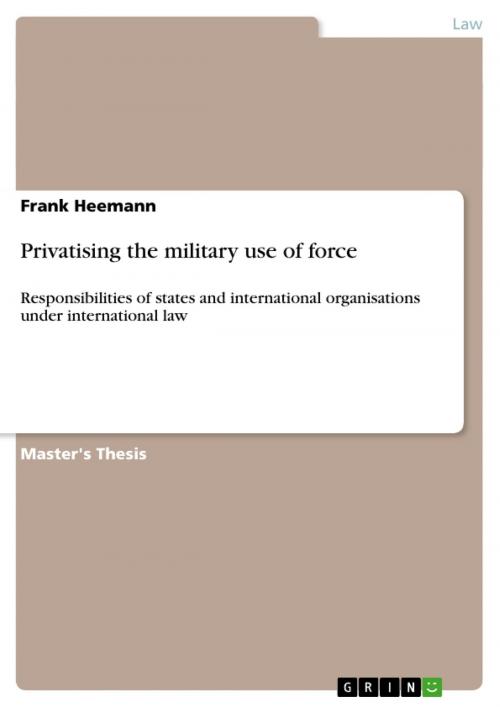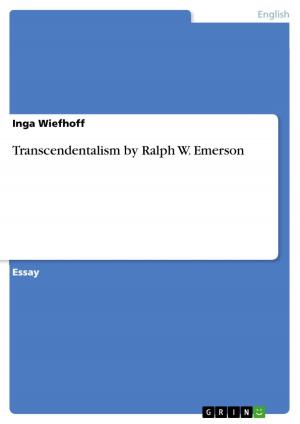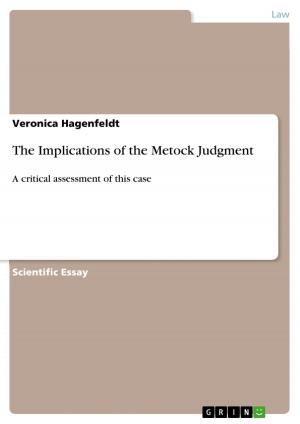Privatising the military use of force
Responsibilities of states and international organisations under international law
Nonfiction, Reference & Language, Law, International| Author: | Frank Heemann | ISBN: | 9783640293094 |
| Publisher: | GRIN Publishing | Publication: | March 19, 2009 |
| Imprint: | GRIN Publishing | Language: | English |
| Author: | Frank Heemann |
| ISBN: | 9783640293094 |
| Publisher: | GRIN Publishing |
| Publication: | March 19, 2009 |
| Imprint: | GRIN Publishing |
| Language: | English |
Master's Thesis from the year 2006 in the subject Law - Comparative Legal Systems, Comparative Law, grade: 80, University of Cape Town (Universität Kapstadt), 170 entries in the bibliography, language: English, abstract: This paper will explore responsibilities that might arise under international law from the privatisation of the military use of force. The aim of the paper is threefold: first, it explores which responsibilities states and international organizations incur under international law if they use the services of Private Military Companies (PMCs), ie if they privatise the use of military force. Second, the paper will use this survey of responsibilities to address the question whether there are, at present, substantial gaps in international law that need to be filled in order to deal adequately with the outsourcing of military force. Third, the paper will then suggest how to deal with such gaps. The paper will be structured as follows: Part II introduces the private military industry. The focus here will be on a categorization of the industry and a description of its impact on the common understanding of warfare which assumes a state-monopoly on the use of force. An understanding of the different categories within the industry and the industry's impact on warfare is essential for addressing the legal question of whether PMCs are sufficiently covered by the existing international laws. Part III deals with the responsibility of states arising from privatising the use of force; this part will first provide a brief categorization of states that might incur responsibility and then introduce, as a point of departure and mental guideline, the accepted rule of state responsibility, whereby a state incurs responsibility for the commission of international wrongful acts. For the evaluation of a state responsibilities, part III will then proceed to introduce states' international obligations that are most likely to be violated in connection with the privatisation of the use of force.
Master's Thesis from the year 2006 in the subject Law - Comparative Legal Systems, Comparative Law, grade: 80, University of Cape Town (Universität Kapstadt), 170 entries in the bibliography, language: English, abstract: This paper will explore responsibilities that might arise under international law from the privatisation of the military use of force. The aim of the paper is threefold: first, it explores which responsibilities states and international organizations incur under international law if they use the services of Private Military Companies (PMCs), ie if they privatise the use of military force. Second, the paper will use this survey of responsibilities to address the question whether there are, at present, substantial gaps in international law that need to be filled in order to deal adequately with the outsourcing of military force. Third, the paper will then suggest how to deal with such gaps. The paper will be structured as follows: Part II introduces the private military industry. The focus here will be on a categorization of the industry and a description of its impact on the common understanding of warfare which assumes a state-monopoly on the use of force. An understanding of the different categories within the industry and the industry's impact on warfare is essential for addressing the legal question of whether PMCs are sufficiently covered by the existing international laws. Part III deals with the responsibility of states arising from privatising the use of force; this part will first provide a brief categorization of states that might incur responsibility and then introduce, as a point of departure and mental guideline, the accepted rule of state responsibility, whereby a state incurs responsibility for the commission of international wrongful acts. For the evaluation of a state responsibilities, part III will then proceed to introduce states' international obligations that are most likely to be violated in connection with the privatisation of the use of force.















